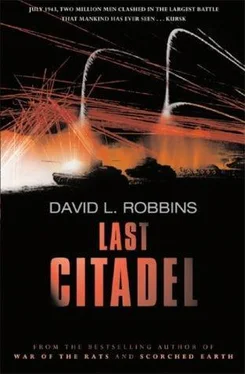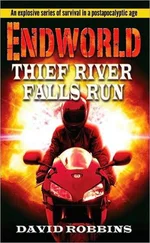He stood out of his hatch into the buzzing day. He scanned the land corridor before him, five kilometers wide between the Psel and the rail mound, searching for the place where he would fight. If he had a horse he would ride the terrain, know the land before you trust it to be your ally. But there was only a slowly undulating steppe expanse here, wide and shallow balka valleys without features of advantage for either army, the earth would not choose sides here. Straight to the west rose the curtain of smoke and clamor, the opening fight for the hill and state farm. Opposite, in the east, looking on from the outskirts of Prokhorovka, Dimitri stood in his driver’s place.
In the middle, on the floor of a broad and shallow valley, set like a golden stamp in a great brown sheet, spread a field of sunflowers. These blooms turned their heads with the shifting light. Today they gaped right, then left, at warring nations. Tomorrow, Dimitri knew, there would be none of them standing at all.
July 11
1840 hours
Oktyabrski state farm
‘Walk with me, Balthasar.’
The gunner rose from the ground on rubbery feet. No one but Luis in the Tiger crew had straightened his legs in over six hours. Luis stood aside until the gunner took his hands from the tank and was steady. The other three crewmen had sat up when Luis approached. They laid themselves out flat when Balthasar and Luis walked away.
Luis and the gunner strode off from the rest of the tanks in the company. Again Luis had brought them through another day of hard fighting without losing a tank. In fact, when the trailing elements of Leibstandarte caught up to the rest of the division in the early morning, they brought with them six more Mark IVs, two had been assigned to Luis. Now, at the end of his fourth day commanding the company in combat, they numbered sixteen tanks.
Luis and Balthasar walked through the remains of Oktyabrski. A gray snow of ash filtered down from the smoldering timbers of barns and silos. A dead Russian lay face up with his hands and legs spread wide, blown there to the ground, a teenager, and he looked to Luis like a boy making a snow angel in the spilling ashes. This was a cold image, Luis did not like it. It reminded him of Leningrad, where he took his wound.
He opened his mouth to speak to Balthasar, then thought better of it. He would have to shout to be heard in this dirt lane, crowded with grenadiers flooding in to take positions in the rubble. Tanks and armored troop carriers careered around the debris piles, and medical wagons collected SS dead and wounded. All the Red corpses were hoisted onto trucks and dumped out on the steppe to be burned. The snow-angel boy was so stiff he was lifted and swung up to the truck like a hammock.
Luis walked Balthasar toward the western edge of the state farm. He smelled himself and the gunner. Their odors were identical, acidy from the backwash of day-long cannon fire, a sort of spoiled citrus tang of sweat and chemical stained their skin and uniforms. The smell of mechanized combat was on them. Luis wanted a postcard of this, to send to his father, and one to Hitler.
The two stood where it was quieter now. They gazed over the terrain they’d seized today. Leibstandarte had clawed another five kilometers closer to Prokhorovka, lunging at first light northeast out of Komsomolets state farm. The division attacked across a wide front, spanning all across the land corridor, from the edge of the Psel to south of the rail mound. The Russians fought hardest on this ground, defending the state farm in the middle. When his panzer company rolled up to attack, they came up short in front of the biggest antitank ditch he could imagine, the proportions were remarkable, the thing was as wide and deep as a river. This underscored Luis’s loathing for the Soviet peoples, revived his thinking of them as drones, to dig such a thing was primitive. His armored attack was thwarted for the morning. This angered him more for the hissing in his head, the sound of the Führers draining patience for this misadventure in Russia. The assault was redirected until bridging equipment could be brought up to cross the giant ditch. An hour later, after regrouping, Luis’s company came at Oktyabrski from the northwest, where the Reds were expecting them. A barrage of machine-gun fire sprang out of the farm buildings, catching the accompanying grenadiers by surprise; even behind tanks they couldn’t advance. Luis would not move ahead into the sting of the dug-in Red infantry without ground troops – this was how Thoma had lost so many tanks – and the attack stalled again. Luis grew grimmer in his commander’s seat, counting minutes, knowing that Hitler in Berlin counted minutes and the swelling number of Americans on the beaches in Sicily. Stukas were called in to cover the pioneers bridging the tank moat in front of the state farm. Finally, at 1400 hours, the ditch was spanned. Every tank of Leibstandarte attacked at once. Ground was gained a meter at a time. Armored transports hauled a full regiment of panzergrenadiers to the leading edge of the battle, Luis’s tanks provided cover and firepower, and together they plowed into the defenders of Oktyabrski. The Reds sent out a paltry rank of T-34s to deflect the assault; a dozen were shot out of their number in the first ten minutes. Balthasar got three of them. The Tiger gunner showed an uncanny hand now with the speed and agility of the Soviet tanks, they didn’t dodge him so well anymore. The state farm fell twenty minutes ago, and with it the last high ground before Prokhorovka, Hill 252.2. Leibstandarte claimed twenty-one Soviet tanks destroyed.
The division was called to a final halt for the day. Again the flanking forces had lagged, leaving Leibstandarte exposed in the middle. The attack on Prokhorovka was forced to wait until morning, to allow Das Reich and Totenkopf to pull alongside. Luis looked backward, at the seven more kilometers they’d captured, up from Komsomolets state farm. The land was darkened and shredded by fighting. Rear elements of the division crept over the plain in the late-afternoon light, bringing food and ammunition and bandages to the warriors walking under the drifting ash of the state farm. It seemed a mighty thing to have done, to have taken this ground back from the Russians. Luis wanted Hitler to stand here with him and see it, he would present Hitler with this present of a swath of Russia, and promise him more.
But the Americans. How can Hitler ignore them? They’re an unknown quantity, an industrial behemoth let loose now in the war in Europe. What kind of fighters will the Americans be? Luis knew the Yanks were in the Pacific tangling with the Japanese, but nothing else. He stared over the churned patch of Russia he’d conquered that day. Japan, America, Italy – those nations were far away and without weight, they were not here in the smoke of killed tanks out on that plain and the burned state farm behind him. He could not conceive that what Grimm had told him would come true, that Hitler would lose his nerve and take this away from him. He did not believe that tomorrow the SS would fail to ram forward another seven kilometers and take Prokhorovka. What could the Reds throw at him tomorrow that they had not thrown today?
Luis raised a palm over the captured plain. His hand floated in the air above the crushed grasses and turned soil, some black smoke plumes. This hand, frail and pale as chalk, did this to the land.
‘It seems like a lot, doesn’t it?’ he asked Balthasar.
‘Yes, sir. It does.’
Luis lowered his hand.
‘It’s not enough.’
Balthasar made no answer. Luis was not curious for what the gunner’s silence said about the man’s reasons for fighting. Probably he’s like the rest, Luis thought. He’s here because he believes in Germany more than he believes in himself. Luis couldn’t be more different. He didn’t want to stop the advance because Germany might get a bloody nose. He’d cover Germany in blood if he could. Russia, too. And Italy and America. Luis alone would know when there had been enough.
Читать дальше












